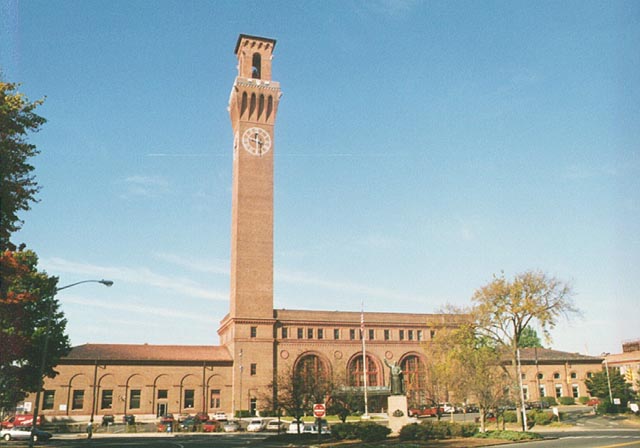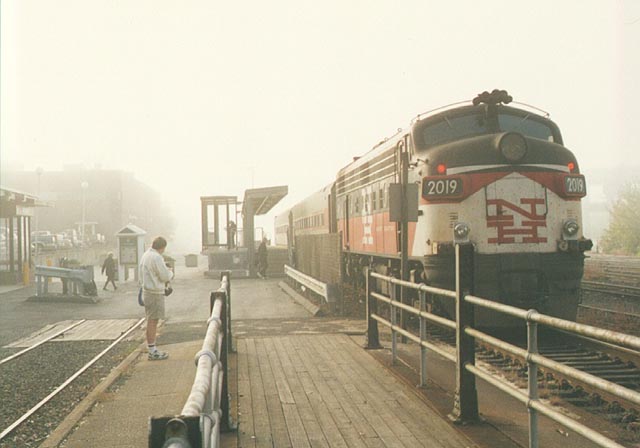Waterbury, Connecticut
One of the most unusual of the larger railroad stations in New
England is Waterburyís Union Station. This unique structure was
constructed by the New York, New Haven & Hartford Railroad and
opened its doors in 1909 as the city of Waterbury was nearing its zenith
as an industrial center and transportation hub. Waterbury and itís
neighboring towns were famous for manufacturing clocks, and the high
clock tower of the station is itís signature characteristic.
The famous Beaux-Arts firm of McKim, Mead, and White prepared
plans for the Renaissance Revival style building. A handsome brown brick
was used for the exterior and careful observation will reveal a
multitude of intricate brick patterns. The quality of this construction
has stood the test of time. Originally, the station clock tower was not
included in the plans. An executive of the railroad had traveled in
Italy, and returned insisting that a tower be added to the station. Thus
the slender 245 foot campanile (bell tower) was added, modeled after the
Torre del Mangia in Siena, Italy. Complete with gargoyles, the tower
houses a clock, the largest in New England. The tower bell was installed
in 1916 and can often be better heard on the cityís nearby hills than
at street level because of the great height of the tower and todayís
traffic noise.

The Waterbury, Connecticut, station is seen on a
beautiful Autumn morning, October 13, 1997. Built by the New York, New
Haven & Hartford Railroad, and today home for the local newspaper.
Jon Rothenmeyer photo
The station replaced an existing terminal on the same site as part
of grade crossing elimination work.
Waterburyís railroads once were part of the ambitious scheme
that connected New England railroads with the Erie. Thus the line was
engineered to the wide gauge that the early Erie embraced. High, wide
clearances allowed the New York & New England as it was then called
to handle freight that could not be accommodated on the Shore Line.
During the height of the passenger era, Waterbury handled some 86
passenger trains a day! In the summer of 1915, six passenger trains
could be seem at one time in the station. Railroad offices occupied the
stations upper floors.
The station is situated in the heart of the downtown area at the
foot of a hill, and a lovely view across a historic town green space
greatly enhances the setting. The New Haven dominated southern New
England, and this station is one of itís best examples of that clout.
In the 1950ís, railroad service began to decline, as Waterbury and the
rest of New England began itís slow migration away from manufacturing
to a service based economy. The station was acquired by the Waterbury
newspaper, today known as the Republican-American. The newspaper added a
wing for itís printing presses, and a second floor was inserted into
the once open concourse. (Second floor office occupants enjoy the
wonderful vaulted ceiling.) Quite possibly this early adaptive reuse
saved the building from demolition.
Passenger service all but disappeared as the New Haven fell into
the chaos of Penn Centralís bankruptcy. Today rail service to
Waterbury has been restored by the Connecticut DOT (Metro North operates
the trains) using rebuilt diesels and MNís plain coaches. The
locomotives, although somewhat the worse for wear, and a bit on the
grubby side, sport the New Havenís famous "McGinnis" paint
scheme from the 1950ís. Given the turn around in commuter railroads in
New England, perhaps one day service will be expanded, and intercity
passenger trains will once again call at this classic landmark.

The morning fog is lifting revealing New Havenís
classic diesel paint scheme on itís namesake rails. Commuterís are
boarding the 9:15 am departure to New York. Jon Rothenmeyer photo.